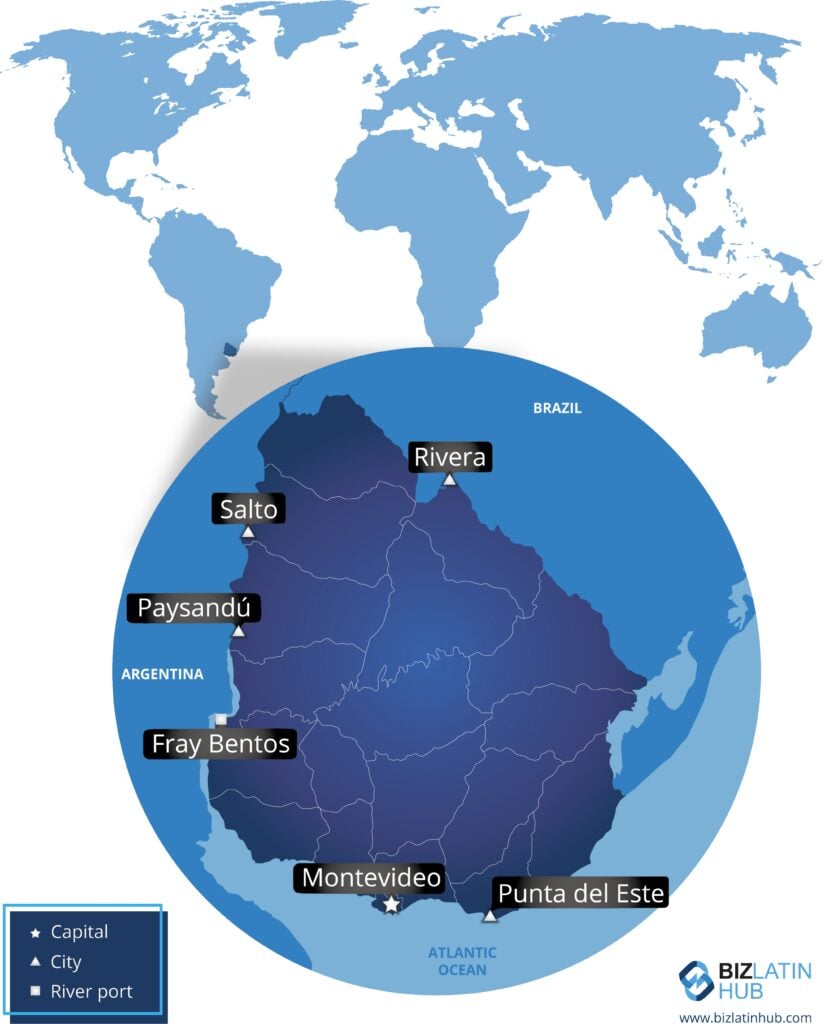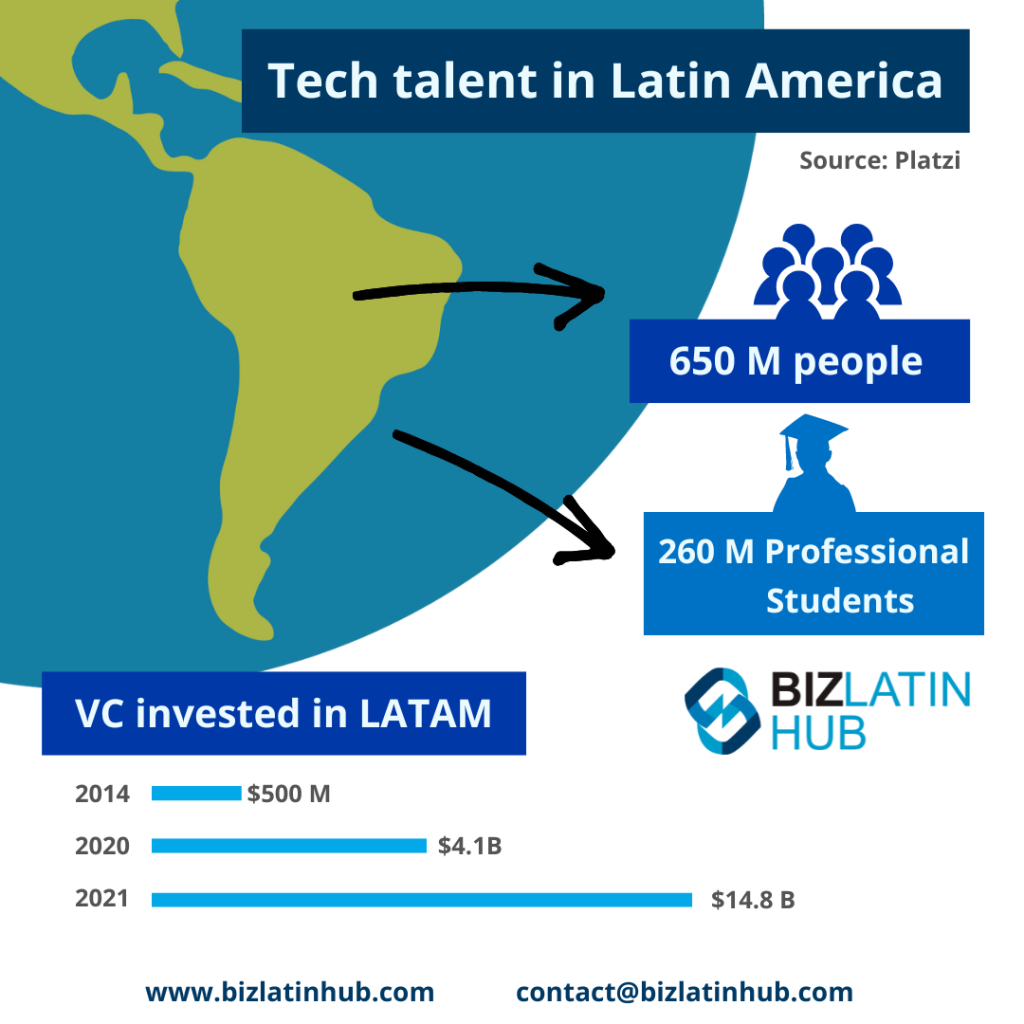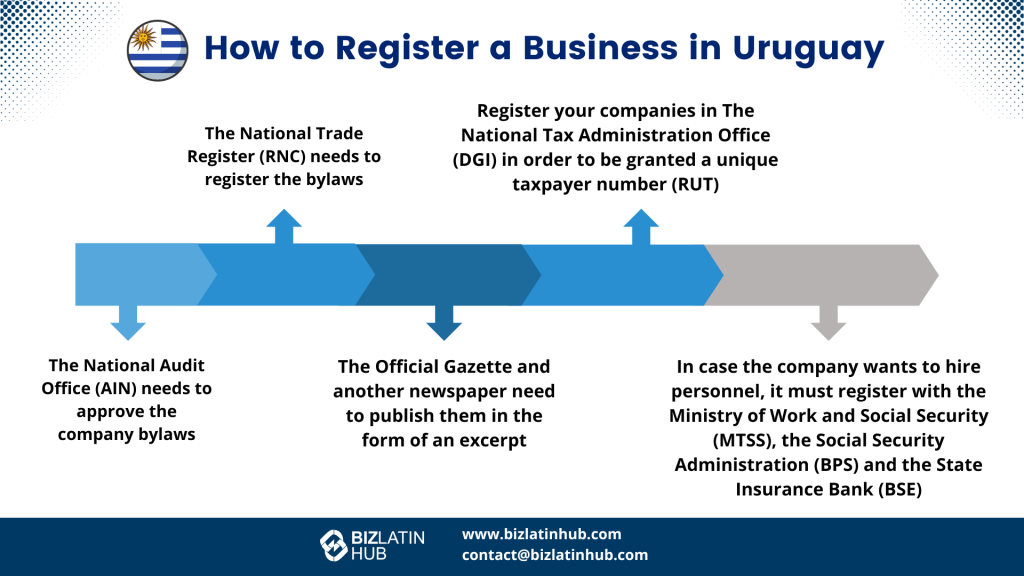For investors from English-speaking countries, or who do a lot of business in the language, choosing to invest in Uruguay is made more attractive by the fact it has one of the highest levels of English proficiency in Latin America.
Uruguay ranks as Latin America’s strongest democracy (Democracy Index 2021: rank 13) and maintains the region’s highest GDP per capita ($17,688 in 2024). As a MERCOSUR founding member, Uruguay provides preferential access to a market of 295 million consumers, while its strategic location connects to 70% of Brazil’s GDP and 60% of Argentina’s GDP regions.

The World Bank classifies Uruguay as a ‘high-income’ nation, with a sovereign debt rating of BBB (Fitch, 2024) and the lowest country risk in Latin America. The nation’s banking system ranks 1st in South America for stability (Global Competitiveness Report 2024), supported by strict regulatory frameworks and a long-standing tradition of banking privacy.
Being so prosperous, with a well-established middle class, the country also has a large professional services industry, so finding a good corporate lawyer in Uruguay with high English proficiency is not usually problematic.
Biz Latin Hub can help you invest in Uruguay or elsewhere in the region, thanks to our network of dedicated local offices across Latin America and the Caribbean. Our market leading array of back office services can support you all way from starting out in the market through ongoing annual accounting compliance and even up to eventual liquidation if needed.
What are the top 4 reasons to invest in Uruguay?
Stability & reliability
Uruguay is a prosperous country with a stable political and economic environment, including a long democratic tradition that has seen regular and fair elections followed by peaceful transfers of power for decades.
The health of the Uruguayan political system is highlighted by the fact the country ranked 13 in the Democracy Index 2021, published by the Economist Intelligence Unit – placing it as the highest ranked country in Latin America and the Caribbean, and seeing it perform better than the likes of France, Germany, Japan, the United Kingdom, and the United States.
Uruguay scores well in the World Bank’s most recent edition of its Political Stability Index, ranking number 20 globally, and once again outperforming all of the aforementioned highly-developed countries.
That stability creates confidence in the market, providing a compelling reason to invest in Uruguay.
Available talent
Being so well-developed, Uruguay boasts a wealth of available talent in a wide range of disciplines – not only limited to traditional professional services such as law and accounting, but growing skilled industries such as tech.

In fact, Uruguay is an emerging financial technology (fintech) hub, with the country’s first startup to be valued at over US $1 billion being a fintech, and the nation bursting into the top 20 in the 2021 edition of the Global Fintech Index.
Fintech is just one subset of the tech industry in which Uruguay is making a name for itself, with companies in property technology (proptech) and agricultural technology (agritech), also notable rising stars.
With strong levels of English in the country, a well-established professional services industry, and a growing pool of tech talent available, its strong human capital is another good reason to invest in Uruguay.
Strategic location
Capital Montevideo provides easy access to major cities in neighboring MERCOSUR members Argentina and Brazil – with Argentina’s capital Buenos Aires a short flight or short boat ride away and Brazil’s economic epicenter and largest city Sao Paulo and Chile’s capital Santiago both less than a three-hour flight away.
Notably, an estimated 70% of Brazil’s GDP, 60% of Argentina’s GDP, and 56% of Chile’s GDP are generated in regions close to Uruguay.
What’s more, freight shipping leaving Montevideo – which is also Uruguay’s principal port – has easy access to Africa and Europe, as well as the rest of the Americas, helping it to be one of the most important ports in the region in terms of container throughput.
Uruguay also boasts strong logistical and infrastructure, as well as some of the best and most reliable telecommunications and electricity supplies in the region, providing obvious benefits to companies doing business in the country.
Quality of Life
If your intention is to relocate to Latin America as part of your market entry, the particularly high quality of life on offer is another compelling reason to invest in Uruguay.
The country’s prosperity, stability, relatively low crime, good weather, strong culinary culture, good infrastructure and facilities, and the famously friendly disposition of its citizens make it a particularly pleasant place to live.
Beyond that, the country also has high-quality and affordable healthcare, while the fact that it doesn’t face any major natural disaster threats is also another significant point in its favor.
All of those factors contribute to Uruguay being named among the top ten countries in the world to retire to in the 2022 Annual Global Retirement Index, published by International Living.
Economic Performance (2024)
| Indicator | Value | Regional Rank |
|---|---|---|
| GDP Growth | 3.2% | Top 3 |
| Inflation Rate | 4.1% | #1 Lowest |
| Foreign Investment Satisfaction | 84% | #1 |
| Sovereign Spread | 89 bps | Lowest in LATAM |
| Banking System Stability | AAA | #1 in South America |
Regional Market Access
| Economic Zone | Population | GDP Access | Trade Agreements |
|---|---|---|---|
| MERCOSUR | 295M | $2.5T | 5 Major FTAs |
| Pacific Alliance | 230M | $2.1T | Observer Status |
| EU-MERCOSUR | 780M | $19T | Pending Ratification |
Investment Framework Metrics
| Category | Ranking/Score | Source |
|---|---|---|
| Democracy Index | 13th Globally | EIU 2024 |
| Political Stability | 20th Globally | World Bank 2024 |
| Ease of Business | 4th in LATAM | World Bank 2024 |
| Digital Competitiveness | 1st in LATAM | IMD 2024 |
Key Investment Sectors (2024)
Technology and Digital Economy
- Fintech sector: 150+ companies, $2.1B market value
- Software exports: $1.2B annually
- Tech workforce: 60,000+ professionals
- Digital infrastructure: 99% fiber optic coverage
Renewable Energy
- Energy matrix: 97% renewable sources
- Wind power: 1.5GW installed capacity
- Solar projects: 260MW operational
- Green hydrogen: $2.5B investment pipeline
Agribusiness
- Export value: $7.2B annually
- Certified beef: 85% of production
- Smart farming adoption: 70% of arable land
- Organic farming: 15% of agricultural land
Strategic Location Advantages
| Metric | Value | Impact |
|---|---|---|
| Port Container Throughput | 1.1M TEUs | Regional Hub Status |
| Flight Connectivity | 15 Direct Routes | Business Access |
| Logistics Performance Index | 4.1/5.0 | #1 in South America |
Investment Process Timeline
- Business Registration: 48-72 hours
- Digital submission system
- Single window process
- Automated verification
- Banking Setup: 5-7 business days
- Digital onboarding available
- International banking integration
- Multi-currency accounts
- Operational Permits: 10-15 days
- Streamlined application process
- Online tracking system
- Integrated regulatory compliance

Investment Protection Framework
| Protection Mechanism | Coverage | Implementation |
|---|---|---|
| Bilateral Treaties | 31 Countries | Full Effect |
| Investment Law | Law 16,906 | Comprehensive |
| IP Protection | WIPO Standards | Full Compliance |
| Dispute Resolution | International Courts | Available |
Biz Latin Hub can help you invest in Uruguay
At Biz Latin Hub we provide integrated market entry and back office services throughout Latin America and the Caribbean, with offices in more than a dozen key cities around the region, including Montevideo.
Our portfolio of services includes accounting & taxation, company formation, due diligence, legal services, and hiring & PEO, meaning we can offer packages of services to suit every need.
Our unrivaled regional presence, which includes trusted partners in many of the markets where we do not operate, means we are also ideally placed to support multi-jurisdiction market entries and cross-border operations.
Contact us today to find out more about how we can assist you entering and doing business in Latin America and the Caribbean.






